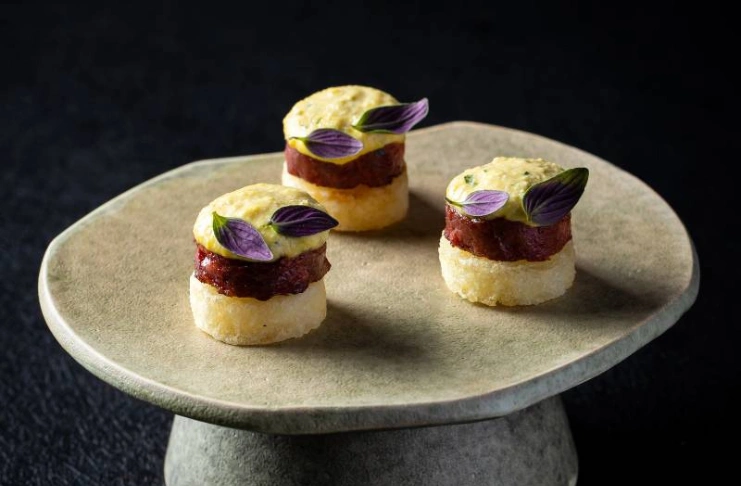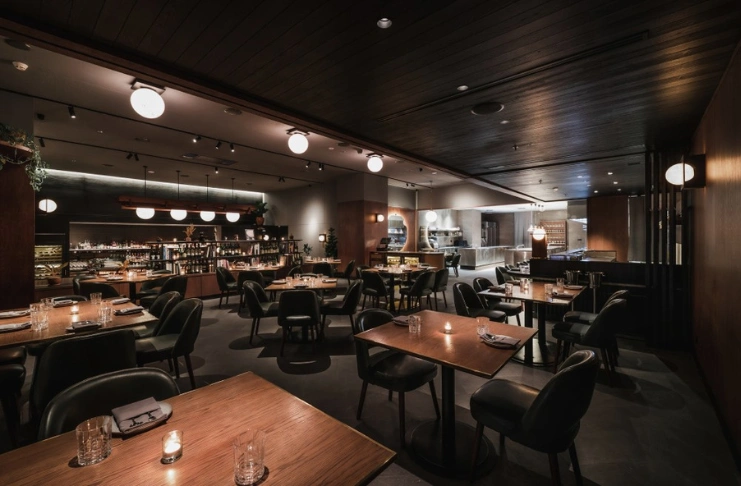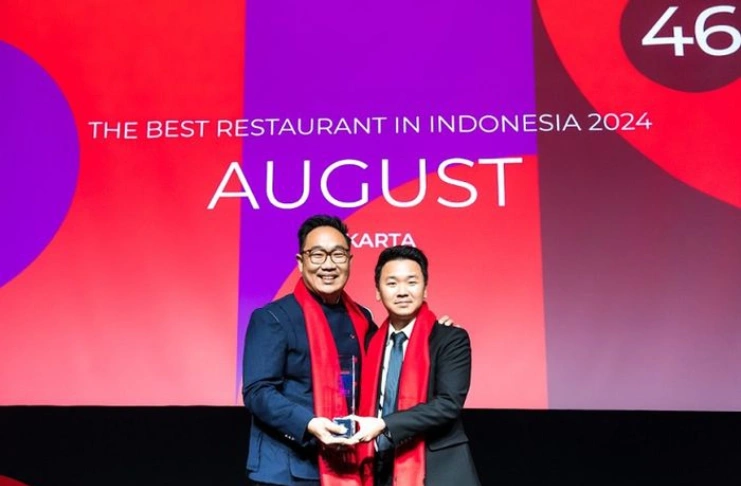There’s something quietly defiant about August.
It doesn’t announce itself with theatrical plating or cliché-heavy storytelling. It doesn’t drape tables in white cloths or force reverence through silence. It invites you in. And then, slowly, deliberately, disarms you.
Tucked into Jakarta’s Sequis Tower, August feels like a room that could belong to a writer or an architect. Quiet, thoughtful, and considered. On paper, it’s fine dining. In practice, it’s more personal than that. Less restaurant, more thesis. Less luxury, more legacy.
Because August doesn’t serve to impress, it serves to remember.
A Culinary Language Born of Memory
When you speak with Hans Christian, one thing becomes immediately clear: the food at August isn’t designed to wow you. It’s designed to move you.
Every dish is a memory. A translation of something once intangible, like his mother’s breakfast, his grandmother’s pantry, his years in kitchens across the world, into something plated and precise.
Take the “Breakfast from Mom,” a deceptively simple rice cake layered with lap cheong and egg yolk sauce. Inspired by Christian’s favorite childhood breakfast, steamed rice with Chinese lap cheong omelet, the dish is reimagined as a crisp rice cake, its exterior golden, its center rich with umami.
That’s what makes August quietly radical. It doesn’t manipulate memory for drama; it respects it. Dishes are not reinterpretations of Indonesian cuisine as much as they are love letters to it. The flavors are grounded in home, but refined through global polish thanks to Hans’s training at Taylor’s University and tenure at Michelin-tier kitchens, including Chicago’s Next.
His partner, Budi Cahyadi, brings decades of five-star hospitality experience to the floor, having managed elite dining programs at the Mandarin Oriental. Together, they’re building something far rarer than a “concept”: a place that earns its emotion.
“We wanted to show a modern concept with finesse, a new experience,” Hans and Budi share in the conversation with The World’s 50 Best.
“Coming back to Jakarta, we realized that there were cafés, bistros, Italian and Japanese restaurants, but not a lot of modern places with a focus on tasting menus.”
A Menu That Moves in Chapters, Not Courses

August’s 14-course tasting menu changes with the seasons and sometimes even with the mood. But its soul is fixed: no dish makes the cut unless it can carry meaning.
One standout: a foie gras PB&J. What sounds like novelty on paper unfolds as thoughtful tension. The peanut element is earthy, not cloying. The fruit is acidic and restrained. The foie, smoked just enough to nudge memory without overwhelming it.
Then there’s the grilled octopus with triple laksa sauce – an homage to the layered nature of Indonesian spice culture. Lemak, asam, curry. All stitched together like languages in the same sentence. Intense, but never aggressive.
A fish course arrives next: local coral grouper with a broth inspired by the central Javanese dish kuah garang asam. The fish bone broth is infused with starfruit family members, homemade curry paste, and lemongrass. Each element references Indonesia’s archipelagic diversity without resorting to literalism.
August is at its most poetic in dessert. A frozen coffee creation made with beans from West Java, layered with meringue and palm sugar, is a palate cleanser for the brain as much as the tongue.
What Makes August Different? Silence.
There is no music in the dining room. That’s not an oversight. It’s a principle.
“We’re very casual; you don’t need to dress to impress here. As long as you feel comfortable, you’ll have a good time. This is not a library with people whispering – they can absolutely be themselves,” Budi explains.
What also separates August from its peers is its humility. Despite the accolades — Asia’s 50 Best One to Watch in 2023, debuting at No. 46 in 2024, and earning No. 49 in 2025 — Hans and Budi operate like they’re still proving something.
Maybe because, in their minds, they are.
“We can take time to develop this baby, mature it,” Hans says. “We’re going to be here and develop the menu, people, structure, and system so we have the confidence to say why we’re here.”
This constant evolution is evident in how the team discusses each dish. There’s no sense of finality, only ongoing refinement. When a guest offers feedback, Hans listens, not with defensive politeness but with genuine curiosity. It’s the mark of a restaurant secure enough to still be questioning.
Design That Doesn’t Interrupt — It Supports

Created by Bitte Design Studio, the interiors are warm and quietly tactile. Raw textures meet soft lighting. Bookshelves line the walls. There’s no grand chandelier, no forced spectacle. The open kitchen flows naturally into the dining area, collapsing the line between the stage and the audience.
It’s an atmosphere where the focus is natural, not imposed.
The Sourcing: Local, Loyal, Intentional
August doesn’t use “local” as a marketing flex. It builds relationships.
Fish is flown in fresh from Lombok. Vegetables arrive from Lembang farms, which the team has visited personally. Cheeses come from Yogyakarta’s Mazaraat, and the chocolate (featured in a signature bonbon) is sourced from Indonesia’s own Pipiltin Cocoa.
These aren’t name-drops. They’re acknowledgments. Every ingredient is introduced with the same reverence as the dish itself.
“We’re probably 80% driven by local produce. We minimize food waste, recycle, take staff meals seriously, and have a meeting once a week to ensure that we maximize our ingredients,” Hans notes.
Why August Isn’t Just for Foodies
You don’t have to understand emulsions or fermentation to love August. You just have to be curious.
There’s no menu printed in obtuse French. No waitstaff rehearsing scripts. The service feels human: the kind that watches your tempo, not just your wine glass.
That accessibility is no accident. It’s by design.
“Dining out in Jakarta is a part of the lifestyle. But here in August, we want to give [people] memories. We want to give them memories through the experience and make them feel special dining here. We want August to be a place where great memories are created,” Budi shares.
A Final Course That Feels Like a First
August is still young. But it’s not fragile. It knows what it’s doing, even when it’s questioning itself. And that’s precisely what makes it special.
It doesn’t care for gimmicks. It doesn’t chase stars. It’s a restaurant with an identity so rooted that it feels inevitable.
In a dining world saturated with chefs trying to be heard, August speaks softly. But when it does, you listen. And more importantly, you remember.





